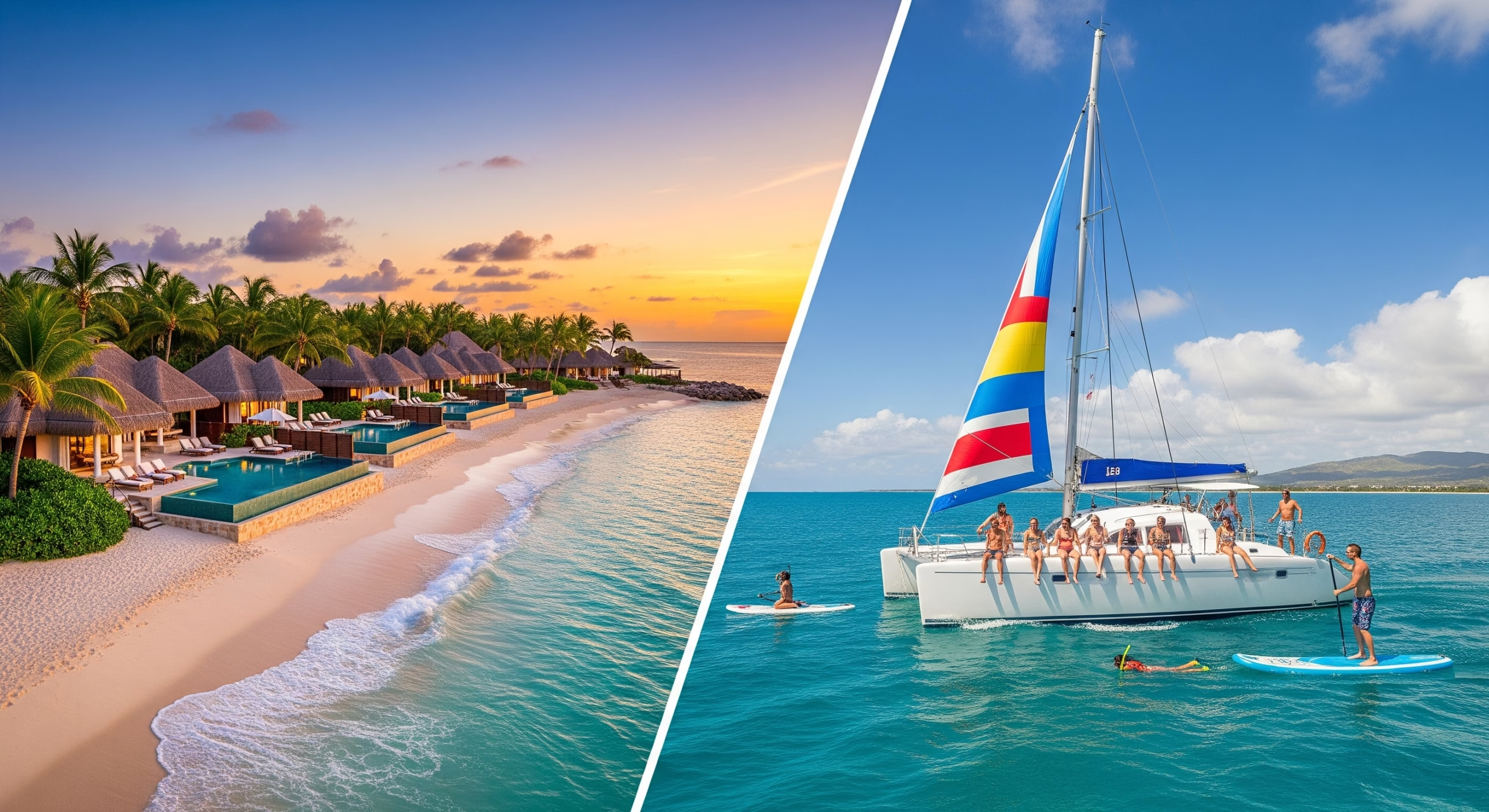Choosing between an all-inclusive resort and a traditional hotel can be a pivotal decision that shapes your entire vacation. While both offer a relaxing escape, they provide fundamentally different experiences. This guide will walk you through the key factors to consider, helping you decide which option is the perfect fit for your next getaway.
What’s the difference?
First, let’s clarify the core concepts:
- All-Inclusive Resort: As the name suggests, this is a one-stop-shop vacation. The upfront cost covers your accommodations, all meals and drinks (alcoholic and non-alcoholic), on-site activities, entertainment, and often tips and taxes. The idea is to pay once and not worry about your wallet for the rest of your stay.
- Traditional (A La Carte) Hotel: This is a more traditional lodging experience. You pay for your room, and everything else—meals, drinks, activities, and services—is an additional cost. This model provides flexibility to explore local restaurants and attractions off-site.
The All-Inclusive Experience: Is It for You?
The all-inclusive model is built for ultimate relaxation and convenience.
Pros:
- Financial Simplicity: The biggest draw is the fixed budget. You know the total cost of your trip before you even arrive, making it easy to manage your finances and avoid unexpected expenses.
- Ultimate Convenience: With food and drinks available at your fingertips, you can truly unwind. There’s no need to research restaurants, make reservations, or carry cash. You can simply grab a meal, a cocktail, or a snack whenever you want.
- Built-in Fun: All-inclusive resorts are often destinations in themselves. They feature multiple pools, a variety of restaurants, and a packed schedule of daily activities and nightly entertainment. This is ideal for travelers who want to stay on-site and have everything they need in one place.
- Perfect for Group Trips: If you’re traveling with family or a large group, an all-inclusive resort simplifies everything from dining to activities, ensuring everyone’s needs are met without constant coordination.
Cons:
- Limited Local Immersion: While you get to enjoy a destination’s scenery, you may miss out on its local culture and cuisine. The convenience of on-site dining can discourage you from venturing out and exploring the surrounding area. NOTE : Many resort companies are now including experiences and excursions included in the cost of the stay. Check out All-Inclusive Adventures: Resorts That Include Off-Site Tours.
- Potential for “Hidden” Costs: While most things are included, some premium experiences, such as top-shelf liquor, certain à la carte restaurants, or spa treatments, might come with an extra fee. Most all inclusive resorts have “tiers” of service, with the premium levels offering top tier alcohol and personalized service along with a different section of the resort.
- Lively and Crowded: The communal nature of all-inclusive resorts can lead to large crowds at pools and restaurants. Choosing the right resort based on your desire for loud versus quiet, or social versus private, is very important. We have always been able to spend time in the social pool as well as quieter pool areas and been very happy.
Typical Included Activities
- Non-motorized water sports: Kayaking, paddleboarding, snorkeling, and sailing.
- Daily entertainment: Poolside games, dance lessons, cooking classes, and fitness activities like water aerobics or yoga.
- Nightly shows: Live music, theatrical productions, comedy shows, and themed parties.
- On-site facilities: Access to the gym, tennis courts, and kids’ clubs.
The Traditional Hotel Experience: Is It for You?
A traditional hotel offers freedom and a more personalized journey.
Pros:
- Flexibility and Freedom: This is the most significant advantage. You are not tied to a single location for your meals and activities. You can dine at authentic local restaurants, explore different neighborhoods, and truly experience the local culture at your own pace.
- Tailored to Your Taste: You only pay for what you use. If you’re not a big drinker or you prefer to eat out, a traditional hotel can be more cost-effective. You can choose to spend your money on high-end dining one night and a casual local spot the next.
- More Unique Stays: Traditional hotels range from small, boutique properties to large luxury chains. This allows you to select a hotel that perfectly matches your desired style, be it a historic inn, a quiet guesthouse, or a trendy urban retreat.
Cons:
- Managing Your Budget: With a traditional hotel, you need to track your spending. The cost of meals, drinks, and activities can add up quickly, potentially exceeding your initial budget if you’re not careful.
- Less Convenient: You’ll spend more time planning your days, making reservations, and navigating a new place. This can be a turn-off for travelers who prefer a low-stress, spontaneous vacation.
- Logistical Challenges: If you’re traveling with a group or with children, constantly finding and paying for meals and activities can become a logistical hassle.
Typical Included Activities
- Pool and gym access: The most common included amenities.
- Basic services: Concierge services, limited hotel shuttles, and sometimes a simple continental breakfast.
- Additional costs: Any tours, excursions, or classes (like yoga or cooking lessons) are almost always an extra fee.
The Verdict: Which Is Right for You?
The choice ultimately depends on your travel style and what you hope to get out of your vacation.
Choose an All-Inclusive Resort if:
- You want a stress-free, convenient vacation with a predictable budget.
- You are traveling with family or a large group.
- Your goal is to stay on-site and fully enjoy the resort’s amenities.
- You don’t mind a lively atmosphere with other guests.
Choose a Traditional Hotel if:
- You want to immerse yourself in the local culture and explore the area.
- You prefer a more independent and flexible travel experience.
- You want to have a greater variety of dining options, both on and off-site.
- Your budget for meals and activities is separate from your lodging expenses.
Regardless of your choice, both options can provide a memorable and rewarding vacation. By understanding the pros and cons of each, you can select the option that best suits your needs and ensures a perfect trip.
Our Personal Experience
We have stayed in both type of resorts, but we like all-inclusive resorts best because we have already paid for the vacation and everything is covered including tips. The larger resorts will have multiple restaurants that are both buffet and and specialty restaurants where you order from a menu. Additionally, these will have “pop-up” dining, cafés, and poolside service.
All-inclusive resorts will typically have multiple pools, swim-up bars, and if the resort is a family-friendly resort there will be an adult-only section which tends to be a bit more relaxing. These resorts deliver awesome entertainment and activities, from bike rides to tequilla tasting, dancing lessons, pool tables, yoga, water Zumba, water volleyball, games, and so much more. Every night they provide professional entertainment such as fire dancing, comedy, magic, musicals, culture, and live bands.
Whichever type of resort you stay in, you may want to experience the area around you. We tend to spend 1 or 2 days of our week-long stay participating in activities outside the resort. Some of our favorite things to do include going in town to experience the culture first hand, visiting landmarks such as ancient ruins, going to ecological theme parks, swimming with dolphins, and cruising on a sunset catamaran. There are so many different excursions to enjoy no matter what country or area that your resort is in.
Resort Recommendations
If this is your first all inclusive vacation, we recommend selecting a resort that consistently is rated Excellent or Wonderful. Lucky for you, we have collected these into one website that only includes these incredible resorts: OnlyTheBestResorts.com
If you are looking for deals on resorts (some of these best resorts offer deals), visit our Deals site.




